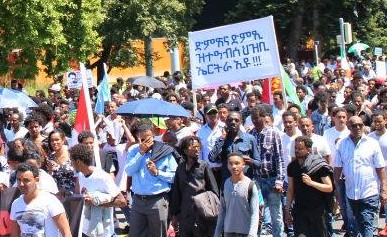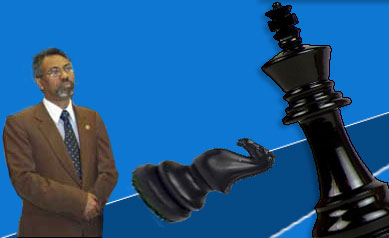Free Citizens and Foot Soldiers

What does a national institution with a name like “Research and Documentation Department” do? If you answered: “Research and publish basic data like the census, national budget, unemployment rate, inflation rate, GDP growth, demographics, etc.” you would be right—for any country in the world. But in Eritrea, where everything, including the population, is a state secret, a nation where you can read about how many sat for a matriculation exam without learning the passing rate (much less the statistical breakdown by region, gender, etc) the job of the Research and Documentation Department is to tell us who is a friend, who is a friend with benefits, who is an enemy and who is a frenemy. And they have just published a 51-paragraph j’accuse document against frenemy America with the delicious (all caps) title of: UNPROVOKED US HOSTILITIES AGAINST ERITREA.
If you have not been following the roller-coaster relationship of the American and Eritrean administrations, the report is designed to make you curse the US (usually euphemistically referred to as “external forces” or “hegemonic powers” ) for picking on poor Eritrea, a nation which is minding its own business trying to develop but keeps facing, mysteriously enough, US hostilities.
After a brief explanation of US cold war calculations in the Horn of Africa in the 1950s, the report jumps right to 1998 (“when Ethiopia declared war against Eritrea on 14 May, 1998…” ), and the US’s role in emboldening the Ethiopian regime’s foot-dragging, stalling, and recanting during and following the border war years; and how this resulted in the US taking a series of diplomatic, economic, political measures against Eritrea that were hostile and unprovoked. The report concludes that the Eritrean regime is entirely blameless in this: that it is all flawed American foreign policy.
But if you have been following the turbulent relationship between Washington and Asmara, the report reads like one of those “identify the pattern” exercises where you are given a series of numbers (in this case: 1 to 51) and you are trying to fill-in the missing numbers and that this report is propagandistic–incomplete and misleading—and not worthy of the “Research and Documentation” name attached to it.
Consider just one issue to see if the “Research and Documentation Department” is providing a complete report:
“11. In December 2003, President Bush announced the cancellation of Eritrea’s membership to AGOA, barely two years after its inclusion. “
Now, let’s find out the missing piece.
AGOA stands for African Growth Opportunity Act, which is designed to provide African countries liberal terms for accessing US markets. Was the US decision to deny eligibility to Eritrea effective January 1, 2004 an “unprovoked act of hostility” or a “commensurate act of retaliation?” What was different between October 2, 2000 when Eritrea became eligible—along with 33 other African countries—and January 1, 2004 when it lost its eligibility? (by the way, if you are counting, that is 3 year plus not “barely two years”)
The pre-requisite to acquire AGOA membership is that the African countries “are determined to have established, or are making continual progress toward establishing the following: market-based economies; the rule of law and political pluralism; elimination of barriers to U.S. trade and investment; protection of intellectual property; efforts to combat corruption; policies to reduce poverty, increasing availability of health care and educational opportunities; protection of human rights and worker rights; and elimination of certain child labor practices.”
In October 2000, when Eritrea became eligible, its government was, at least publicly, enjoying a reputation for taking the necessary steps to build a nation based on the rule of law, political pluralism, human rights and market privatization. There was a constitution drafted and awaiting ratification; rules on party formation drafted (its drafter, Mahmoud Sheriffo, had only been jailed for several weeks), national elections were scheduled; its private press journalists had been in prison for only weeks, and there was frequent talk of privatizing public companies. By 2004, when it lost its eligibility, Eritrea’s ruling party was silent about the constitution, cancelled the elections, was dismissive of democracy, pluralism, and market-based economy.
It is important to remember that these values were not “imposed” in 2000 by the United States (President Clinton); they were (like the Millenium Development Goals) developed after a fairly long “public comments” section. That is: when Eritrea acquired AGOA membership, the ruling party had not only signed on to the terms of membership but it, along with the overwhelming majority of African states, had reached a consensus that they are reasonable standards to strive for.
Was the decision to make Eritrea ineligible arbitrary and directed only against Eritrea? The record shows that it was not only Eritrea that lost membership in AGOA. The Central African Republic did. As did Cote d’Ivoire, Mauritania, Guinea, Madagascar and Niger. Some never had it; some got it; some lost it; and some who lost it regained it.
In one of his interviews, Strongman Isaias Afwerki once said that the AGOA is meaningless, anyway, because Eritrea has nothing to export. That’s accurate enough. Fine. But one can’t complain about violating the terms of a covenant, being held accountable for the violation, while at the same time saying, “it was a meaningless covenant, anyway.”
The “Not That There’s Anything Wrong With That” Defense
Seinfeld has given us many gifts—and one of them is the line “not that there is anything wrong with that.” It is about claiming that you are what you are not; then correcting the record and asserting that you really are not what you have claimed you are, while at the same time claiming that there is nothing wrong with being what you were claiming to be, but are not.
The “not that there’s anything wrong with that” defense is one that the Eritrean administration uses often.
1. Is Eritrea a democracy? Asmara’s answer is: (a) Yes, it is because democracy means people’s participation in how they are governed and in Eritrea there is nearly 100% participation in the affairs of the nation. (b) No, we are not, and not that there is anything wrong with that because democracy is a process and it takes a long time to take root. (c) Whether we are or we are not is none of your business because we are a sovereign state. Is Saudi Arabia a democracy? Is China a democracy?
2. What is the status of the Eritrean constitution? (a) It is pending ratification due to the no-war no-peace situation; (b) it is ratified and to the extent it is not fully operational it is because we, out of the kindness of our hearts, want to spare the death penalty to our former comrades who have been proven (in the court of our heads) to be treasonous. In the words of one of my all time favorite senior PFDJ officials: anta kemzi isikhum hatsyawiyan tfetw’wo fiorin meqesn ribbon’n ayHaznan ember, Qwam’si yserH alo! [We haven’t used the flowers and scissors and ribbons to mark it, the way you imperialists do, but it’s working!] (c) Not that there is anything wrong with not having a written Constitution: the United Kingdom doesn’t.
3. Are we being held hostage by the Ethiopian regime’s decision to refuse to comply by the terms of the EEBC? (a) yes, of course, are you stupid: look at all our productive labor focused on national defense! (b) no, of course not, we outsmarted our enemies: that’s not an issue, it is a blessing in disguise: look at how cleverly we have deployed our youth and how fast we are developing the nation. In fact, “virtual demarcation” is superior to “on ground demarcation.”
4. Is Eritrea supporting Al-Shabab? (a) No, it is not. (b) Not that there is anything wrong with supporting Al- Shabab: there is no evidence that Al-Shabab is a terrorist organization; there maybe one or two terrorists but it is a nationalist organization (and it is damn inconvenient that Al-Shabab pledged its allegiance to Al Qaeda.)
5. Is Eritrea a one party state? Answer: (a) Yes, it is. (b) No it is not, because PFDJ is more than a party, it is a People’s Front. One party implies that it is an institution that serves a faction of the people; we serve everybody. (c) Not that there is anything wrong with being a one party state: America’s first president warned against having multi-party country.
The last point—that George Washington was against multi-party state—is not part of the report presented by the “Research and Documentation Department” of the PFDJ; it was an editorial presented by the Ministry of Information (MoI) when it was responding to the State Department’s report that Eritrea is, among many things, a “one party system.” “Moi?” asked MoI, “I am a one party system? Well, take this!”:
“It is to be noted that the first US President, George Washington, in the last days of office had proposed not only in words but also through writing that if the United States is to become a country of the people, it has to embrace one-party system.” (Source)
Well, kinda. Yeah, Washington warned against “factionalism” (South vs Northeast), but it is also to be noted that the contemporaries of the first US president, Jefferson and Hamilton, ignored the advice of the sainted president, formed political parties, and he didn’t arrest them on some trumped up charges.
Frenemies
When it comes to its relationship with the US, there seems to be genuine puzzlement on the part of Eritrea’s ruling party on several grounds. First, says the Eritrean government, we are what we have always been: the same group of people that you designated with much fanfare as part of the promising leadership of Africa (along with Yoweri Museveni and Meles Zenawi) in the 1990s are in charge of Eritrea. So, why are we all of a sudden terrible leaders? And why are they, Museveni and Zenawi still your darlings?
Second, says the Eritrean administration, is our human rights record and our religious tolerance level really worse than that of Ethiopia or China or Saudi Arabia? Or of South Korea and Phillipines in the 1980s? So why are you picking on us? Why do you have double standards?
Third, if “rule of law” is so important to you, there is a glaring violation of the rule of law—international law—right under your nose: it is called the Eritrea-Ethiopia Boundary Commission ruling. Not only are you not demanding accountability from Ethiopia for flouting international law, you are rewarding it. Doesn’t that make you hypocritical?
Therefore, since you are telling us that your foreign policy towards Africa is not based on the principles that you claim to espouse—human rights, democracy, rule of law—we are just going to do things our own way. We are going rogue and we are going to befriend those nations whom you have called rogue. We will do this until you see the error of your ways and rectify your behavior.
The Eritrean government’s strategy for winning American support seems to be predicated on making Eritrea an indispensable nation to the US. They have read their history and looked at all the authoritarian allies the United States used to have—South Korea, Singapore, Philippines, Indonesia, much of Africa, much of South America—and concluded that they do not have to be for democracy, human rights, political pluralism, etc. They just have to present themselves as rulers of a country that is indispensable to US interest. The only Israel ally across the Red Sea, the only stable country in the Horn of Africa, a bulwark defense against Islamic fundamentalism, a force for stability in Somalia and Sudan, the glue holding together a potentially disintegrating Ethiopia and Sudan, a 1,400-mile coastline with deep water ports. In the immortal words of Girma Asmerom, Eritrea’s former ambassador to the US: “We are perfect for America; we have deepwater ports for its navy, mountains very similar to those in Afghanistan that can be used for training purposes and airfields that can accommodate its aircraft.”
As these things go, it has a winning hand. It has a fine product to sell. Now, when you have a product you can’t sell, it can mean that (a) there is something wrong with what you are selling; (b) there is something wrong with the salesperson. (c) there is something wrong with the buyer. In this case, there really is nothing wrong with what the Eritrean government is selling (much of what is written in the preceding paragraph is true) so the only two conclusions are there is something wrong with the buyer and the salesperson.
The salesperson certainly believes the problem is with the buyer. Accordingly, we are strongly encouraged to organize petitions, lobbies, demonstrations to protest the “unjust” treatment of the USA—in Europe, in Australia, in the US, in Canada—anywhere in the world. (Eritreans are allowed to petition every government except their own.)
The senior salesperson even tried to incentivize the buyer; but the buyer just wasn’t buying it:
When I pressed Afewerki about human-rights abuses, which Rumsfeld had pointedly raised in their meeting two weeks earlier, he said, “If you just leave us alone, we will handle these matters in a way that won’t damage our bilateral relationship and won’t embarrass us or you.” He indicated that he would be more likely to satisfy U.S. demands on human rights in the context of a growing military partnership, but would not do so if merely hectored by the State Department. (Source)
But this strategy contradicts the conclusion of the Research and Documentation Department: the United States has always had an adversarial relationship with Eritrea because the US always favors Ethiopia. Assuming this is true, then doesn’t it follow that the US, regardless of all the protests and pressures, will never come to the support of Eritrea so long as Eritrea is feuding with Ethiopia? And since the regimes of Eritrea and Ethiopia have both publicly pledged that mutual regime change is their objective, and reconciliation on each other’s terms is not an option, isn’t the Research and Documentation Department pretty much concluding that the US will never change its current policy towards the Eritrean government? So what is with all the lobbying and pleading particularly when the American government has been quite specific about what is required to “normalize the relationship”?
In a properly constructed relationship between governments and the people, it is the government that has to earn the consent of the people to be legitimate, not the other way around; it is the government that gets measured on its performance, not the other way around; that a citizen is a citizen by virtue of birth, but a government remains a government by the consent of the governed. In democracies, the government cannot have a vote of confidence on the people (when it praises, we the people call it pandering and when it criticizes, we the people consider that a career-ending move); it is the people that can give or withdraw votes of confidence and they can be as fickle as they like.
And when a government fails in its major tasks—bringing durable peace; safeguarding national sovereignty; creating a just society where the young can grow up, be educated, and work in the land of their birth—then we the people have no duty to it, no matter how tightly it wraps itself around the flag. In a democracy, the people hold the balance of power: they hire and fire their government; in authoritarianism, the government has all the power: it bestows and withdraws privileges on the “inhabitants” (never citizens.)
This is really the difference between those who still support the government and those who oppose it. Those who support the government are saying that they have so much faith in the competence and legitimacy of the government, that they are willing to be its foot soldiers in enforcing its will for as long as it takes. Those of us in the opposition, or to use the parlance of the regime supporters, those of us who are “the so-called opposition,” are saying that we have no so-called faith in the government’s so-called ability to solve any of Eritrea’s so-called spiraling problems and, as free citizens, we are exercising our right (if not yet our ability) to fire it.
It is a fight between those who aspire to be free citizens and those who are content to be loyal foot soldiers. Those who choose to be “neutral” really are being “neutral” by being deliberately ill-informed, which is a polite way of saying ignorant (and the nation really is not served by ignorant people); those who choose to have dual personalities–publicly with one side and privately with the other side–are really exhibiting schizophrenic behavior and the last thing a nation full of Post Traumatic Syndrome victims needs is a group of schizos; and those who, for whatever reason, want to compromise our status as “free citizens” by yielding our exclusive rights to others are being naieve and misguided. Even worse, they are denying us our moral higher ground to claim our free citizens status by appearing to be too willing to be somebody else’s foot soldiers. This has always been the problem of the Eritrean opposition and it is something that, at long last, it is waking up to the realization that, in politics, perception is as important as reality.



Awate Forum